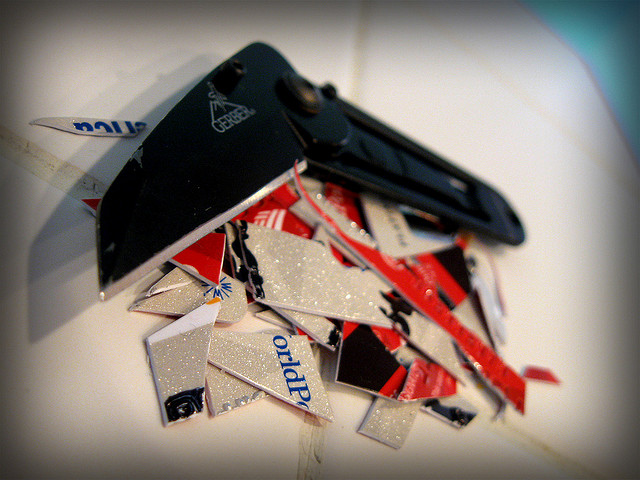
You’re in a difficult situation. This month’s bills are piling up, but they’re left unopened because you’re still making the minimum payments on the ones left over from last month. The money market’s tight and your credit history has been going down the drain for a while, so you’re pretty much the posterboy (or girl) for the riskiest person to lend to. You lose yourself for a while in the statement screaming at you with its bold print and red ink, throw up your arms and moan, “I’m going insane.”
Debt is a scary thing. It can accumulate quicker than you think and getting rid of it is a huge struggle for many. The following is not a step-by-step guide to reduce debt, but simply proven ideas that could work for you, depending on your situation. They have been tested, they are true, and you don’t have to be in debt to pick up some good habits.
Open up your wallet and marvel in all the credit cards you have, in all the colours of the rainbow. Now take out all of them except for one and put the rest away (save them from yourself!). Keeping multiple cards with relatively insignificant balances on each is dangerous, because you don’t realize exactly how much you’re spending in total! Switch to paying in cash and have that one credit card there for emergencies only. (And no, a new Coach bag does not qualify as an emergency.)
Look at your recent purchases and ask yourself, “What’s unnecessary?” You might be surprised at how many things you’ve got just sitting around and collecting dust. Sales with huge markdowns can be super tempting, but the trick is to know your “wants” from your “needs” and only buy things that you really need.
If your biggest weakness is impulse shopping, only buy from places with a good return policy and follow the three-day rule! That is, after you’ve lugged home the numerous shopping bags, put them away and don’t touch them for two days. On the third day, allow yourself to finally take out the items but don’t rip off the tags! Instead, leave it out there in the open and at the end of the day, decide whether you really need it or not.
Although it might seem very overwhelming at first, having a list of all your debts laid out in front of you — with the amounts, minimum payments, and interest rates — can give you a good place to start. If you view your debt on paper (visually), reality might set in about just how much unnecessary spending you’re doing!
Once you’re organized, start by focusing on paying the debts with the highest interest rates. Make sure you are meeting all the minimum payments on the other debts, too. Next, pay off the debts with the smallest balances because you’re definitely capable of paying them off, and you don’t want to be racking up interest for no good reason. Another great tip is calling up your bank and negotiating a lower interest rate or transferring your balance to a lower interest rate card.
Once you’ve already saved up some dollars by practicing smart shopping, it’s time to draw up a plan so that you can really perfect your budget. Be as realistic as you can when creating your budget, because you’re going to be the one sticking with it! It should include what you intend to spend this month, as well as any major purchases in the year.
Instead of renewing the expensive gym membership, think about following free exercise videos on Youtube or practicing new outdoor activities such as hiking, biking, and even jogging. You can even try learning a new sport and bring a friend to the local tennis courts (it’s free, too).
Buy your expensive grocery needs in bulk at Costco, like meat, eggs, and dairy products. Find your inner chef and surprise your family by learning new recipes instead of eating out. This can also get you into a lifestyle that is healthier if you’re looking to trim down that waistline or lose a little bit of that belly fat. Making dinner also means you’ll have leftovers to pack for lunch the next day — yum!
For an in-depth guide on how to your personal eliminate debt, check out Jacob Merkley’s Debt Destruction Plan. It’s includes his own success story with step-by-step actionable instructions on how to escape the burden of debt.
Getting listed the high interest debts is the best option to repay the debt within a time period. If debt list is in front of you than it will remind you every time to pay off them. I like this way to get rid of debt.
Thanks Jason.
Wow! Very great tips…How do you suggest students go about paying off their debt(s), considering it’s a pretty tough job market out there and not all students will land a high paying job right away?
Good question. Creating a budget and building debt repayment into the budget is crucial. Even if you are on a tight budget there are still likely some areas where you trim. Also go after high interest debt first.
Unfortunately many couples are not working as a team and sometimes hiding debt from each other. Often incomes are much different between spouses -some pool as “our income” some don’t. Often they bring a lot of debt into a new relationship especially younger couples with student loans or those who have been separated or divorced.
Thanks Eric. Those are some great points.